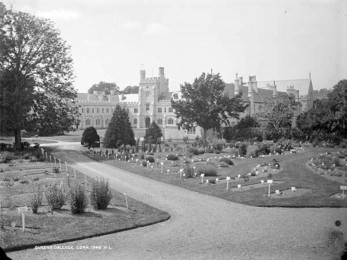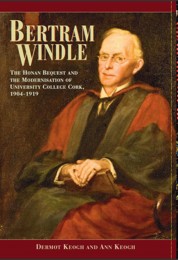
Article 627- 9 February 2012
Technical Memories (Part 5)
Towards a Munster University
Bertram Windle became a familiar person at most Cork Civic gatherings and on so many public platforms throughout the country as he sought to reconnect Queen’s College Cork to public life. He got people talking about education and re-energised its importance. As President of the Irish Technical Association, he attended several Technical Congresses from Newry to Tralee, where on average 150 delegates from all parts of Ireland attended. The delegates represented on average 60 Technical Committees and the principal Chambers of Commerce and Industrial Development Associations.
A journalist for the Irish Independent on 25 July 1906 remarked of Betram Windle:
“Satisfaction will be felt throughout Ireland at the appointment of Dr. Windle, the able and energetic President of the Queen’s College, Cork, to a seat on the Intermediate Board. Since his arrival in Ireland Dr. Windle has taken an active part in promoting the cause of education; he has also identified himself with the industrial movement and the Gaelic revival. He, as a sound educationist, must see that any thorough system of primary and Intermediate education for this country must be so arranged as to fit the pupils to acquire such a training in these schools as will enable them to avail of the advantages of Technical Instruction.”
In September 1906, a resolution of the County Council of King’s County (Co. Offaly) demanded a Catholic University. It was unanimously adopted by Cork Corporation. In connection with the same subject, a letter was read at the Council meeting (written about in the Irish Independent) acknowledging the vote of thanks passed to Bertram Windle by the Corporation for his recent report to the King on the ways forward for Queen’s College Cork. In the letter, Windle strongly argued: “There are those who think that Cork could get on very well without any college at all, or with one, which was only of the nature of a superior Technical Institution. I am glad to find that these opinions are not shared by the representatives of the citizens of Cork itself, and I am also glad that they have made the important fact public. At the present juncture it is not my place to point out the advantages which the city would reap from the possession of a University College.”
Whilst as President of such bodies as the Cork Literary and Scientific Society and a member of the General Council of Medical Education in Ireland, Windle’s practical experience and wide knowledge were freely given for the public good. As one of the Special Commission appointed to prepare the stations and regulations, Windle was able to play a prominent and important part in laying the foundations of the new Cork university. In 1908, the University Act, in connection with which Windle was one of the Chief Advisers of both the government and the Catholic Bishops, removed the semi-official religious ban, which had previously existed, and enabled the college in its new guise, as a constituent college of the National University, to take its place in the national life.
On the university campus, through his work, Bertram Windle saw the construction of a new chemical and physical laboratory, and a new biological laboratory. He re-conditioned and re-organised the medical school. Private benefaction was also enlisted in support of projects, which government assistance could not be obtained. Prominent among these gifts were the Honan Hostel, the Honan Scholarships and the Honan Chapel.
Windle’s services to the church and education were honoured by the Pope in 1909 when he was made a Knight, of St Gregory the Great, and he received an additional honour of knighthood from the King. Once he had revived and reorganised the Cork College he was once more able to devote himself to literary work, and several important books appeared from his pen. His work, The Church and Science (1917), was awarded the Gunning Prize by the Victoria Institute in 1919, the first time this distinction was ever awarded to a Catholic writer.
In 1917-18, Bertram Windle acted as a member of the Irish Convention, summoned by Lloyd George, to arrange, if possible, an agreed scheme of self-government. He accepted the invitation to become a member of this assembly with enthusiasm, believing a resolution between North and South could be found. He was disappointed at the inconclusive settlement. He also sought an Independent University for Munster. With the support of all the leading men of the Province and backed by resolutions of its lending bodies, a committee was formed in 1918 to further the project and bring it to fruition. Considerable progress was made, a draft bill was prepared and the support of the government obtained. However with the 1919 General Election and the rise of the new Sinn Féin party, the scheme lost national support.
Almost at the same time, in October 1919, Bertram Windle was offered the position of Professor of Anthropology at Saint Michael’s College, Toronto, the Catholic College of the University of Toronto. Discouraged by the lack of support for his Munster University idea, he took up the position and spent the next ten years in America. He died in 1929.
To be continued…
Captions:
627a. Queen’s College Cork, c.1900 (source: National Library, Dublin)
627b. Portrait of Betram Windle from the front cover of Ann and Dermot Keogh’s book on Bertram Windle
